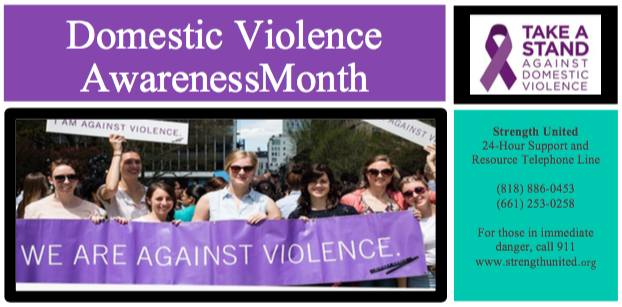What is Domestic Violence?
Domestic Violence (DV) is when one person in a relationship, or previous relationship, hurts another person. DV includes:
- Physical Abuse - hitting, shoving, biting, kicking, or throwing things
- Emotional Abuse - yelling, controlling the other person, or making threats
- Stalking - repeated and unwanted attention from a partner that causes fear
- Sexual abuse - forcing someone to do something sexual without their permission
Facts about Domestic Violence
According to the Center for Disease Control:
- One in every four women will experience DV during their lifetime.
- DV and abuse can happen to anyone.
- 1.3 million women are victims of physical abuse by an intimate partner each year.
- 85% of DV victims are women; 15% are men.
- 44% of lesbian women, 61% of bisexual women, 26% of gay men, and 37% of bisexual men experience rape or physical abuse
Warning Signs
People who are being abused may:
- Seem afraid or anxious to please their partner.
- Receive frequent, harassing phone calls from their partner.
- Have physical injuries, saying they are from "accidents."
- Be restricted from seeing family and friends.
- Have very low self-esteem.
- Be depressed, anxious, or suicidal.
How to Help a Loved One
Do:
- Approach the person at a time and place that is safe and private.
- Take the time to listen and believe what your loved one says.
- Let them know you care about their safety, that they do not deserve to be hurt, and that the abuse is never their fault.
- Be patient and respect their choices.
- Encourage them to call a DV hotline.
Don't:
- Do not accuse, judge, or blame your loved one for their situation.
- Do not pressure them to leave their abuser. There are many reasons they may choose to stay, fear for example.
- Do not feel the need to be an expert.
Getting Help for Yourself
- If you are in immediate danger, call 911.
- Call one of the resources listed below to receive help and support.
- Plan ahead. Pack a bag ahead of time that will be available to take with you when it is safe to leave. Be sure to include extra clothes, important papers, extra money, and an extra set of keys.
A day at a time is all it takes to go from victim to survivor. - Domestic Violence Survivor
Resources
Strength United
24-Hour Support and Referral Lines
818-886-0453
661-253-0258
The National Domestic Violence Hotline
800-799-SAFE (7233)
Rape, Abuse & Incest National Network
800-656-HOPE (4673)
For this brochure in Spanish, please click here.




